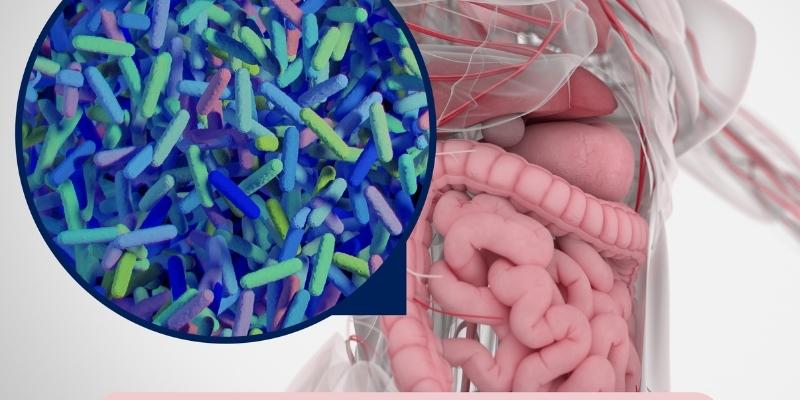Unveiling the Influence of Gut Bacteria on Human Health: The Microbiome's Role
Oct 19, 2023 By Madison Evans
The human microbiome, an entire universe of microorganisms in our bodies, is a health and wellness focus. Our digestive system's gut microbiome, home to billions of bacteria and other microbes, is central to this tiny cosmos. This bacteria regulates digestion, the immune system, emotions, and cognitive function. This article explores the gut microbiome's complex world and how it affects human health.

The Human Microbiome Unveiled:
The microbiota of our skin, mouth, and digestive system is terrific. Despite appearances, our bodies are superorganisms with more microbial than human cells. The gut microbiota governs health and sickness in this massive ecosystem. A trillion bacteria, viruses, and fungi in the gut microbiome digest food, absorb minerals, and synthesize vitamins. Each person's genetics, diet, and surroundings create a unique ecosystem.
Gut Microbiome: Universe Within:
More profound research on the gut microbiota indicates a galaxy beyond space exploration. The gut microbiome is impressive, with each species serving a particular purpose. These microorganisms' complex interactions maintain a delicate health-sustaining balance. In this microcosm, beneficial bacteria break down fiber, generate vitamins, and promote immunity. Also, they control hazardous infections. Dysbiosis may disrupt this balance and produce health issues. Scientists are examining this delicate balance to understand how gut microbiota influences health.
The Gut-Brain Link:
The gut-brain interaction is a fascinating health topic. It reveals remarkable stomach-brain connections. The stomach is termed the "second brain" for its intricate neuron network and neurotransmitters. An "enteric nervous system" impacts emotion, conduct, and cognition. This relationship requires gut microbiota. Gut bacteria generate mood-regulating serotonin and dopamine. Thus, the gut microbiome influences mental health.
This link opens up mental health therapy possibilities and has substantial implications. Psychobiotics, which use probiotics to treat mental wellness, is increasing. The gut-brain relationship shows that well-being extends beyond the body to complex microbial interactions. A healthy gut microbiome may promote mental and emotional health and quality of life.
Controlling Digestion and Nutrient Absorption:
The gut microbiome controls digestion and nutrition. Food digestion requires gut bacteria. Digestive enzymes fail to break down complex carbohydrates and fiber despite their support. Indigestible molecules are broken down into energy- and anti-inflammatory short-chain fatty acids. The microbiome's digestion creates vitamins B and K for numerous physiological functions.
Gut bacteria help food absorption. Calcium and magnesium absorption increases with a healthy gut microbiota. Poor microbiota may induce malabsorption and nutritional deficiencies. Recognizing that gut microbiome influences overall health is crucial. Prebiotics, probiotics, or fermented foods aid digestion and nutrient absorption, providing our bodies with what they need.

Immune System Support:
The gut microbiota helps our immune system work well. This small colony of bacteria teaches our immune system to identify infections from helpful ones. It protects the intestinal lining from dangerous microorganisms. Immune health depends on this defense mechanism. The gut microbiota also produces natural antibiotics called antimicrobial peptides.
An uneven or compromised gut microbiota may not educate or support the immune system, rendering people more prone to infections and autoimmune diseases. Maintaining a varied and healthy ecology is important because the gut microbiome supports the immune system. Eating probiotics, prebiotics, and fiber-rich foods and living a healthy, gut-healthy lifestyle may boost our immune system and fight illnesses and infections. The gut microbiome's health benefits remind us of our complex, symbiotic connection with them.
Maintaining a Balanced Microbiome:
Our health depends on gut microbiota balance. Several methods may promote a varied and balanced microbiome. Eating prebiotic-rich foods is one way. Non-digestible prebiotic fibers feed gut microorganisms. Prebiotic-rich foods include onion, garlic, asparagus, and bananas. Yogurt, fermented sauerkraut, and kimchi contain probiotics, which assist in regulating the microbiota.
A gut-healthy lifestyle is also crucial. Regular exercise, stress reduction, and sleep improve gut microbiota. Avoiding unneeded antibiotic usage is crucial since they disturbs gut microorganisms. The aim is a diversified microbiome that effectively performs digestion, absorption of foods, and antibody support. Microorganisms that improve human health thrive in this technique.
The Microbiome's Influence on Chronic Diseases:
Recent studies have linked gut flora to a variety of chronic diseases. Obesity, diabetes, and autoimmune illnesses are increasingly linked to microbiome disturbances. These findings on the gut's involvement in health and illness highlight the importance of gut ecosystem homeostasis. Gut microbiota imbalances may have serious health consequences. Chronic inflammation from microbial imbalances causes obesity and other health concerns. Gut microbiota affects the response to insulin and glucose metabolism, contributing to diabetes.
Besides metabolic difficulties, gut dysbiosis has been related to autoimmune diseases, including rheumatoid arthritis, which is an autoimmune and MS. Inflammatory from gut flora balance may aggravate autoimmune illnesses. This growing awareness of the microbiome's role in chronic illnesses stresses gut health's importance for overall health.
Perhaps the most exciting part of this new study area is microbiome-based medicines. These gut microbiome-balancing medicines may reduce chronic sickness. This sector is young, but its potential is remarkable. Microbiome-focused therapy may enhance patient quality of life and severity of chronic illnesses. The gut microbiota is vital to our health, as this essay shows. Research shows a healthy gut ecology prevents chronic diseases, including metabolism and autoimmune. It also suggests that microbiome-targeted drugs might revolutionize healthcare by improving health outcomes. As we learn more about the gut microbiota, microbiome-focused medicines offer hope for a healthier future.
Conclusion:
In conclusion, the gastrointestinal microbiome is a fascinating ecosystem that regulates many bodily systems that affect our health and health. This article has shown the microbiome's role in digestion, nutritional absorption, immune system support, and chronic illness.
Understanding the gut microbiota helps us make health decisions. A healthy microbiome is linked to general well-being. Therefore, we must nurture and safeguard it. A diet full of prebiotics in food and probiotics, gut-healthy lifestyle habits, and monitoring of antibiotics may help maintain a healthy microbiome.
As microbiome science advances, we're learning more about how gut bacteria affect human health. These findings might change healthcare, with microbiome-based medicines promising chronic illness treatment and well-being. As we study the microbiome, we get closer to discovering the keys to good health and a better future.







